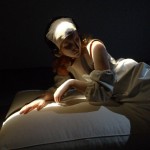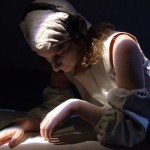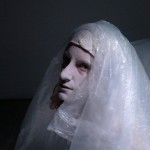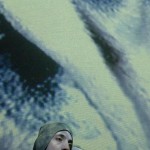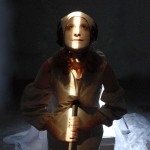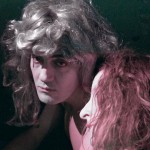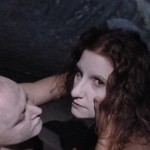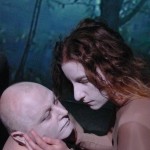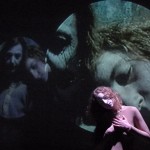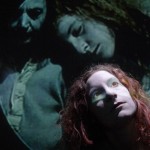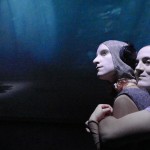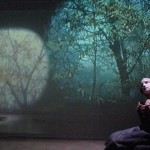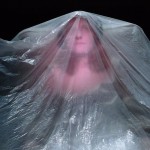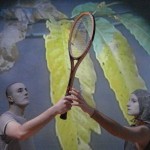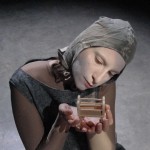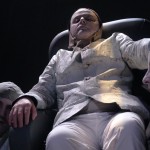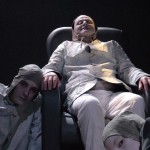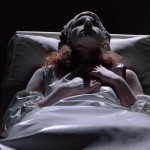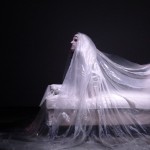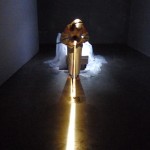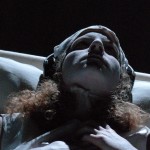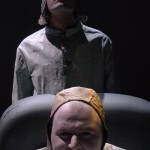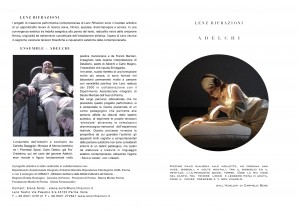
ADELCHI
L’Adelchi it's the dark side of Betrothed: a tragedy-blind spot, a blind area, an intermittently bright no-vision zone. In this dark spot, at times illuminated by the presence of God, the common mournful destiny of the two brothers is fulfilled – Ermengarda and Adelchi. These two levels are reflected in the internal darkness/light of the interpreter, Carlotta Spaggiari/Ermengarda, actress with autism spectrum disorder, and coincide with its most intimate nature: dual in his absolute desire for presence and need for retreat, in emotional hypersensitivity deployed in expressive silence, in the extraordinary artistic density silenced by communication phobia. Its duplicity takes on mysterious forms in scenic creation; dismantling logical and analogical processes, behavioral predictability, it brings us closer to the sublime: destructive and regenerating force of the performative act.
After macro staging of The Betrothed, the two-year project dedicated to the work of Alessandro Manzoni continues with a creation inspired by Adelchi. Placing the founding authors of Italian culture at the center of its scenic-dramatic investigation, Lenz imposes a profound reflection on the poetic power and rhetoric of the Italian language. The staging of Manzoni's tragedy (1822), and the movement for a reflection on the tragic genre in contemporary theatre. Ermengarda is psychophysical love, the wound of abandonment is in the body and in the spirit, the pain transfigures and cements the heroine, making her mute and hard to the demands of normal living. Margrete dal Faust by Goethe, Hölderlin's Antigone, Kleist's Penthesilea, Rosaura di Calderón de la Barca, Shakespeare's Ophelia, Lucia and Gertrude by Manzoni, Ovid's Dido and many other female figures have overlapped with each other, in theatrical time, until only one is composed, as large as a monumental installation by Christo – the great American artist – under which there is only emptiness, solitude and freedom like pure air.' Ermengarda becomes an epiphany of encounter of multiple lived stories, of broken loves, suspended, postponed, forgotten, imposed and liberated. Manzoni's Ermengarde represents the existential and theatrical culmination of the remission that derives from the refusal to which Charlemagne condemns her, making her an innocent victim of impotent and depersonalizing suffering. The epilogue of the tragedy is suicide as a gesture of extreme withdrawal from the self and the pain of existence. Here is another figure of a woman who loves until death and in the delirium of love communicates directly to Heaven her mortal amazement in the face of her own abandonment. Ermengarde does not surrender to the reality of history, the one that powerful males decide, but he gives himself over completely to his own feelings, to the intimate story of a lover that all passion contains, in the unsaid, in the undeclared, in the chaste constraint within one's own ego. E, like a delirious and light Penthesilea, let Eros and Thanatos lead her by the hand beyond the edge of life. The choir, subjectively, he can only describe his reunion with Nature by singing a requiem in progress in front of his silent body. Only an equally powerful and light sensitivity of an actress can be experienced, without fiction, such a culmination of pathos and expressive force.' In Adelchi, History is contemplated through the internal drama of the protagonists, sublimated into a religious vision of life. Adelchi and Ermengarda are spirits full of contrasts between ideals and feelings (peace and glory for the first, the love still alive for the groom for the second). They live for high and noble ideals, they understand the anguish and suffering of others and only find in death the full realization of their complex and troubled personality. Adelchi, before dying, will say that on earth “all that remains is to do wrong or suffer it”: this is typical Jansenistic pessimism, which can be contrasted with a providential conception of pain (suffering is a gift from God since it proves that no harm has been done).
The Adelchi ensemble is made up of Carlotta Spaggiari, Nun of Monza as a child in The Betrothed, Charles Right, formerly Fra' Cristoforo, here in the role of the young Adelchi, moral hero and fundamental figure in Manzoni's poetics and by Franck Berzieri, engaged in the dual interpretation of Desiderio, father of Adelchi and Charlemagne, the emperor who repudiates Ermegarda. The three actors, limited nucleus of a much larger formation, they trained in the permanent laboratory aimed at people with psychic sensitivity that Lenz has been creating since 2000 in collaboration with the Integrated Mental Health Department of the Parma Local Health Authority. In the long laboratory journey that preceded this performance project, the multi-year search for a pedagogical verb has been substantiated that allows people suffering from autism spectrum disorders, to express their 'silenced' emotions through the dramaturgical-sensorial stimulations of the theatrical experience. This process reverses the perspective from which to look at autism: the apparent cognitive and behavioral limitations of autistic people are not considered symptoms of a pathological deficit, but codes to be developed and translated into contemporary aesthetic language, through the agony – physical and vocal – with the classics.
by Alessandro Manzoni
Dramaturgy | imagoturgy | film scenes | Francesco Pititto
Installation | plastic elements | regia | Maria Federica Masters
Musica | Andrew Azzali
Interpreters | Carlotta Spaggiari | Charles Right | Franck Berzieri
Rehabilitation project manager | Paolo Pediri
Lights and technique | Alice Scartapacchio
Production | Lenz Foundation
ADELCHI from lenz foundation on Vimeo.
– Adelchi, Ermengarda, the humble, the ghosts, the sensitive actors of Lenz Rifraczioni
by Massimo Marino, Corriere della Sera.it_BoBlog_A city that speaks_11 December 2014
It's called Adelchi but she is the protagonist, the humiliated one, the offense, the sacrificed one, Ermengarda. He moves in a world of shadows, shadow herself, in an opalescent milky scene veiled by transparent sheets, in Lenz's latest work Rifrazioni a Parma. It takes place in the beautiful Natura Dèi Teatri festival, who tried to give voice to the opera that Giuseppe Verdi thought about a lot and never wrote, King Lear, and presented the masterpiece that is Maguy Marin's Singspiele. Adelchi arrives on stage after I Promessi Sposi (made last year), in a diptych of the "humble" entrusted to those "sensitive actors" with whom Lenz has long chosen to share his artistic journey, former chronic patients of the Colorno mental hospital, down, autistic people and other people tormented by suffering, from an alleged "normal" communication deficit, which heightens other sensitivities, other echoes, other presences. As in the Betrothed, more than in that setup which invited the public to move between various veiled rooms, here we are faced with ghosts, in a muted scene, like the sounds that surround us from the beginning, a symphony of plane takeoffs, of dogs yelping, of city or stadium crowd. White veils mark four environments, this time in front of the audience. In front there is a chair with a tennis racket; behind an armchair with a man who will wear the clothes (metaphorical) of the powerful, Wish, the Lombard king father of Adelchi and Ermengarde, and Charlemagne, the husband who repudiates Ermengarde, the enemy who defeats Adelchi. At the bottom a bed covered by a plastic that, in perhaps the most emotional moment, it will become a package wrapper to cover the protagonist's suffering body, as in the works of the sculptor Christo, that envelops buildings and monuments. And then there is a side corridor that allows these ectoplasms to get closer, to manifest itself. Ermengarda is entrusted to the gentle presence, intense, receptive by Carlotta Spaggiari, “actress with autism spectrum syndrome”, the room notes inform us. According to director Maria Federica Maestri, she is a perfect interpreter of the two light/dark levels of this tragedy: “double in his absolute desire for presence and need for retreat, in emotional hypersensitivity deployed in expressive silence, in the extraordinary artistic density silenced by communication phobia". He is a vessel that receives, that accumulates, what a treasure, that this Ermengarde suffers, who introduces himself by saying (with a microphoned voice, like all), shadow emerging from the shadow: “I hear in my ears, I listen, I receive, I hear... a voice that I recognize... I know it... I don't speak but I say... the wind comes out of my mouth, you sigh, arie…”. He is a figure who humbles himself in front of the man in the armchair-father-husband (Franck Berzieri), on all fours like a dog, then offering herself almost naked to the groom, from which she is expelled. And he seeks comfort in his brother (Charles Right), he too was destined to succumb. With him he plays a silent tennis match without the ball made up of evolutions, of hugs, of affection: and the non-existent ball is lost at a certain point, vanishes, dream and regret of happy times. As in Manzoni, evil is done or suffered: and these inglorious heroes suffer it, becoming figures of martyrdom, seeking refuge, perhaps now impossible, under the wings of the God who consoles, silent here. His inane. She breathes under the plastic at the bottom, shadow of anxiety. She wraps herself in monastic robes and, between the gasp and the cry of a long agony, utters words of pain, with ears blocked by headphones, words of tragedy like fury... bristling... face... pale... pain... pity... white bed... on the ground... dried up... offended... in a long litany of disjointed syntax, of monumental wound, to create through sound and reiteration, a critique of meaning, of the world that inflicts pain. Characters, floating in the fog, after Adelchi's failures, after vain attempts to duet, they cocoon each other in their own space, on three separate floors, in a long twilight of these losers of life: who has the power (i priest), who doesn't have it (children); who dies and who is happy to suffer the wrongs, so as not to do them. Patient theatre, of sufferings. The suggestions of this show are extracted from the literary work of Alessandro Manzoni and left to navigate freely, between films projected in round shots of an ever-changing countryside, autumnal, spring, trees, dry branches, then flowers, and dogs, in the continuum of the pulsation of an indifferent nature. This process sometimes leaves the viewer lost, also because this tragedy is not known, in its junctions, come The betrothed, it is not such a shared “myth”.. You have to abandon yourself to the images, to broken words, letting yourself go floating in an echoed world, deeply, within himself. Yet a dissatisfaction still remains, which perhaps pertains to the genre. Manzoni abandoned tragedy after Adelchi, perhaps because of its expressive rigidity, its precise channel of tone and shape, it did not allow us to show the infinite mobility of reality. Here too the sensation is that the pain in its theatrical reiteration becomes, in the end, unsustainable, already foreseen, redundant, somewhat rhetorical. Lenz's intent is to dig beneath this rhetoric too (It seems). And yet here is the happy arbitrariness, demiurgica, of their best works sometimes gives saturation before being productive, shocking vertigo. Leaving admired, Anyway, for the work of observation of the people actors he puts on stage, in a meritorious long-term laboratory work carried out in collaboration with the Parma Local Health Authority - Integrated Mental Health Department. In addition to directing, Maria Federica Maestri signs costumes and installations; Francesco Pititto accompanies her in the conception, taking care of the dramaturgy and "imagoturgy", construction of the imaginary world. The music is by Andrea Azzali.
– Adelchi, Lenz Refractions throws us into a terrible fairy tale by the Brothers Grimm
by Tommaso Chimenti, Il Fatto Quotidiano_18 December 2014
In Lenz's works Refrazioni is more about the silent, the unsaid, the so elaborate and dried that we arrive at an essence, to a sublimation first of the word and then of the gesture. Read between the lines, dismantle fragments, move within the lines projected within the fascinations, auditory, visual and sound, against that darkness, dangerous as a vortex, that cloaks and attracts like a wedge, sucks like a needle in a haystack. This last one is also “Adelchi”, that comes later”The betrothed” from last year (we are inside their exhibition “Natura Dèi Teatri”, to the nineteenth edition) suffers and enjoys the same peculiarities. As if there was no history, or as if the story managed to pass through other channels other than the classic ones of the relationship between audience and stage. The disorder enters through the pores, the discomfort but also the elegance and refinement of a certainly artistic journey, fully social, densely laboratory, governed by both actorial needs and at the same time the recovery of certain mental pathologies. What recovery is the wrong word in this context: you just want it (gigantic and infinite thought, constant effort) empower some people to express themselves, through the universality of theatre, of roles, in the splitting of the character, bring out what, with the others, on the outside, in everyday life, is locked, defused, stopped motionless, compressed, silenced. Theater can do. All the actors are bearers of various psychic sensitivities, of various disorders. It feels like we've ended up in Alice's hole, inside a terrible fairy tale by the Brothers Grimm. It's not so much the black that surrounds but this solid and sticky patina of constant dim light that strains the heart and retinas. There is an effort, wanted, shared, accelerated, in trying to focus on figures dancing behind filters such as curtains and gray booths fluttering as they pass by, to the heat of racing around the screens like sharks without prey, of being able to concentrate on sparse and sparse objects, try to see what isn't there, the invisible to the eardrum and inaudible to the pupil. Get to the bottom of it, dig. The works of Maria Federica Maestri and Francesco Pititto, they are disturbing, diabolical, brutal in their exhibition ferocity, now cryptic and enigmatic, now clean and simple visions blooming like flowers with an acrid smell of fine. Around the "battlefield" composed of three different "apartments", scenes at the same time, exposed paintings or blocks, divided by transparent sheets, filters that on the one hand create a disorientating and distracting perspective, on the other, for accumulation, it fades it as a wireless telephone, he superimposes it, changing its connotations as a slurred bolus, foggy, controversial, dull as wheat beer. The centrally planned agon-agora (there is something of mass and catacomb ritual in all this) it is fenced off by white sheets from which blind hands and noses and faces emerge and point, pressing from the outside to form Luciferian images that would like to break through the wall, violently intruding into the object with infernal Dante-like force. Two mobile figures create dadaist racing and futuristic speed, while one sits in a dominant, reigning position on a chair-throne. A rock and two joyful yet tragic moray eels marked by an inevitable fate. The tragedy, written almost two hundred years ago, here it is reduced and by subtraction arrives at four characters for three actors: Ermengarda (intense Carlotta Spaggiari) repudiated as a wife by Charlemagne, and Adelchi (good shoulder is Carlo Destro) son of the last Lombard king, the two Manzoni brothers, accomplices united by a marked fate paved with pain, pene, suffering. In the center the monumental figure (Franck Berzieri is incisive, Charlemagne and Desiderius) in the light blue hospital pajamas, with tones of contempt and affection, greed and lust, screams and caresses. Dogs bark in the distance, their bark is sterile and pungent, imploring like that of Pinocchesco's Melampo. The Lenz put in another performance, a human installation of reiterated gestures, of looped beats, while in the videos behind them they tear dry red autumn leaves like bulldogs looking for the right smell to follow. In this mixture of enjoyment and shame, of forgiveness and defeat, hope has no solidarity or reason for citizenship; everything is soiled and damned in this Valley of Tears, a birth that mixes D'Annunzio's pleasure with Foscoli's pain up to Leopardi's intimate suffering.
– Adelchi- Nature Gods Theatres 2014. Hope and Utopia
by Daniel Rizzo, Persinsala_January 11th 2015
National premiere of the new production – signed Lenz Rifrazioni – taken from the production of the putative father of the Italian language: Manzoni's Adelchi in the reinterpretation by Francesco Pititto and Maria Federica Maestri is staged within the Natura Dèi Teatri festival. After the impressive I Promessi Sposi, Lenz's interest in language as an instrument of culture and power returns to Alessandro Manzoni. To be borrowed, in the specific case, It is the famous tragedy by Adelchi: the last prince of the Lombards, died asking Charlemagne for clemency for his father, against whom Desiderio himself had waged war to avenge the offended honor of his daughter Ermengarde. An unfinished literary and moral creature if seen from the perspective of the hypothetical perfection achieved by the Author in his major text (The Betrothed), because – deprived of the key presence (also from a narrative point of view) of divine providence - an invasive Jansenist pessimism prevails in Adelchi which distances any concrete possibility of spiritual conciliation and synthesis between suffering and justice. A theological position characterized by the substantial denial of free will and the idea of salvation only by the grace of God, so cumbersome as to force our Author to give shape to a human being so inevitably headed towards defeat («There is no such thing as an innocent person: all that remains is to do wrong, or kick it"), as that of the Betrothed will be to success (according to Manzoni's religious reformulation of the relevant concepts). Therefore a work profoundly linked to the inevitability of suffering and the idea that the end of existence can never be happy. The violence of domination and the pain caused even to the innocent (like Ermengarda, married and repudiated for political purposes by her beloved Carlo); the possibility of a meaning of life which can only be achieved - and paradoxically - with and in death; the body and soul of women mortified and bent to the needs of power (male); the individuality of conscience that succumbs to the Absolute Spirit of Reason of State; the fragmentation of existences and the fragmentation of communication are disruptive elements due to the opaque evidence and transparent emotionality with which they are presented to the public by Francesco Pititto and Maria Federica Maestri. We will see in the dramaturgical restitution, Indeed, impossible games between brother and sister, broken voices between mother and daughter, metaphorical relationships between father and daughter, transfiguring projections placed between the stage and the audience. Simple techniques only in appearance, but extremely complex to fit together in the management of timing and stage dynamics, especially thinking about the sensitivities of the actors on stage, capable of inhabiting a scenography – of three linear and parallel spaces, divided by a transparent veil - as essential as it is symbolically dense in imparting an overall visual perception of separation and laceration. An accurate aesthetic analysis from a conceptual and glacial point of view from an emotional one, which cannot ignore what is one of the many details, yet another, which makes Lenz Rifrazioni's artistic and existential project unique: the ability to bring together intuitions and dramaturgical solutions of absolute value, like the powerful Shakespearean echoes in the construction of the figure of Ermengarde and the homogeneous coherence of the ensemble, with the opening of the same beyond any delimiting definition in narrow artistic or therapeutic boundaries. It's not theater, but it doesn't even rehabilitate the meaning of this representation; it is not interpretation, much less expression that of the actors; what the public witnesses is not fiction or reality. What you admire – through the sensational quality of Carlotta Spaggiari, Carlo Destro and Franck Berzieri – is the extraordinary synergy in the interminable horizon of the life of a humanity that searches for itself and that, after having explored the avenues made available by the law (who would like them somewhere else in the back of his eyes), he was able to choose art to take and change shape. An event that, without aping hypothetical normality or emphasizing an alien condition, it simply offers itself, demolishing once again «the idea that a disabled person can/should approach the theater only by making the authenticity of their condition invisible (that is, finding a credible place for one's otherness with respect to the unquestionable decision of those who make themselves the yardstick of normality)», as already mentioned regarding the fantastic work of Satyamo Hernandez (The voices of metamorphosis). It's theater and it's rehabilitation; it is interpretation and it is expression; it is conscious fiction and it is immediate reality. It's exponential exposure to risk, powerful manifestation of human shortcomings and the corresponding yearning that determines them positively and not as errors. It is the most sublime example of what culture could be but is not in a code-regulated way (written and oral) based on the canons of aggressive individualism (your mors, my life). So, it is the construction of a language (which has the most important exponent in Italian literature in Manzoni) as a model of non-disciplinary and coercive power, but anarchic and creative, whose attempt represents the intimate essence of Lenz Rifraczioni (which has been collaborating with the Parma Local Health Authority - Integrated Mental Health Department for over a decade, organizing permanent workshops aimed at people with special sensitivities and bringing to the stage results of absolute artistic value). A utopia, probably, capable of reminding us that "the important thing is to learn to hope" (Ernst Bloch), that art is finally able to «introduce chaos into order», freeing ourselves from (your) «lie to be truth» (Theodor Adorno). A non-ideological and all-encompassing utopia, because it is not linked to the dominant thought, but a practical and revolutionary experience of truly overcoming the alienation/solitude of the human being through an authentic exercise of love for life in its vastness. Hat.
– The Lenz's is a "real" Adelchi
by Laura Bevione, Hystrio_January 2015
Second chapter of a two-year project dedicated to the rediscovery of Manzoni, cleaned of the same blanket of dust deposited on the author by the scholastic vulgate, Lenz's new show Rifrazioni explores Adelchi, tragedy read through the soul and gaze of three actors, suffering from autism spectrum disorder, which the company defines as “sensitive”. On stage, which three almost transparent sheets/diaphragms divide into as many designated places, the four characters around which act, according to Maestri and Pititto, the tragedy is constructed: Frank Berzieri – sit on a throne-chair – is Desiderio and also Charlemagne; Carlo Destro is the young and disoriented Adelchi; while Carlotta Spaggiari is the pure and desperate Ermengarda. And the latter is the real protagonist of the show: Pititto and Maestri found in the young actress an unusual capacity for total adherence to the sad fate of the daughter of the Lombard king Desiderio, forced by reasons of state to marry Charlemagne who, following the clash between the Franks and the Lombards, he repudiates her without mercy. Carlotta doesn't play Ermengarda but Ermengarda, in his awe of his father, in her passionate love towards her husband, in desperation that leads her to death from a broken heart. A truth of feelings and thoughts that gives precious authenticity to a stage on which Manzoni's dusty tragedy is revived and filled with new meanings. They are apparently simple yet very dense images and inventions: Adelchi and Ermengarda who, like obedient dogs, they crawl at the feet of their father Desiderio, incapable of the aggression of the two mastiffs who appear in the suggestive images projected on the sheets; the two brothers miming a tennis match, faking the impossible challenge with one's destiny, one's "sudden misfortune". The precision and refinement of the scenographic and visual system are effective objective correlatives of movements of the soul that the accentuated sensitivity of the three highly concentrated interpreters can translate into a performance of rare and excruciating truth..
– Nature Gods Theatres. Lenz's contaminations Refractions from Verdi to Manzoni
by Andrea Alfieri, Krapp's Last Post_13 gennaio 2015
A festival that happens to build, search and rebuild again. It is the spirit that accompanies Lenz Rifrazioni in the nineteenth edition of Natura Dèi Teatri, staged in the post-industrial spaces of the Lenz Theater in Parma in December, and third chapter of a conceptual trilogy dedicated to the works of Gilles Deleuze. Expressly dedicated to contemporary performative culture, and characterized by a deep-rooted attention to interdisciplinarity, Natura Dèi Teatri brought together multifaceted visions and identities for ten days, in a kaleidoscopic and international proposal of reflections on the changing languages of the visual arts. Radical proposals, extreme at times, stratified in disorientation, restless perspectives and acrobatic conceptualities, and still rigorously poetic, projected towards reckless curiosity and solid intelligence. The Two Plans as the title of the exhibition, and as a tool to probe a creative duplicity that implements two levels of meeting/clash, memory and present time as generators of different potentials between the evident and the unexpressed. The festival was the occasion for the debut of two new works by Lenz Rifrazioni, “Verdi King Lear_The opera that doesn't exist” e “Adelchi”. “Re Lear” it is the first study of an opera that will see its definitive form as part of the Verdi Festival of 2015. Conceived in collaboration with the electronic musician Robin Rimbaud and the Parma Conservatory of Music, it is a dramaturgical research, musical and visual on an unfinished opera by Verdi, never set to music although the libretto written by Antonio Somma exists. “Adelchi” it is instead the second work linked to the two-year project dedicated to Alessandro Manzoni, started last season with “The Betrothed”. The two shows are enriched by the stage presence of actors with psychic sensitivity, trained by the permanent laboratories that Lenz conducts in collaboration with the Integrated Mental Health Department, multi-year collaboration and stylistic feature characterizing many works of the theater directed by Maria Federica Maestri and Francesco Pititto. And both are inserted into a scenic environment divided by almost impalpable sheets that host the appearance of virtual suggestions, where the spaces divide the expressive simulacra of the actors, in a ghostly journey that unearths the echoes and deepest fragments of the mysterious subjects that converge in the works of the cornerstones of Italian music and literature. But while in “Re Lear” the rereading navigates towards the research and experimentation of a reinvention of Verdi's silent creative aspiration, disseminating concrete testimonies performed by opera singers throughout the narrative, in “Adelchi” the experience becomes more introspective, more intimately incommunicable. And Manzoni's tragedy becomes a symptom of an almost mythological duplicity, the urgency of an ascetic retreat that can dissolve the drama on one side, and the human need to affirm and deploy one's physical and aesthetic presence. […]
– Rereading Manzoni, an “Adelchi” full of senses and meanings
by Valeria Ottolenghi, Gazzetta di Parma_9 December 2014
Since its origins, Lenz Rifraczioni has created real research paths, multi-year projects for authors, through stimuli, for cultural stimuli. And after “I Promessi Sposi” the in-depth study dedicated to Manzoni continues with “Adelchi” – and within the Festival Natura Dèi Teatri, in the third year of “Sufficient Reasons”, from the intellectual solicitations of Gilles Deluze, now – after “Ovulo” and “Glorioso” – “I Due Piani”. This precious one, refined formation from Parma underlines the performative value of the creations, which however never have an occasional character, transient, ephemeral. A special richness of elaboration therefore and often involving "sensitive actors", many of whom have already starred in other shows. So also in “Adelchi”, playwriting, imagoturgy, and film scenes by Francesco Pititto, installation, plastic elements and direction by Maria Federica Maestri, music by Andrea Azzali, interpreters Carlotta Spaggiari, Charles Right, Frank Berzieri, lights by Alice Scartapacchio. Debuted at Lenz Theater on Sunday evening, “Adelchi” lives between multiple layers of white veils, clear screens that create transparencies and on which clear images are revealed on different levels, neighborhood meetings, a dog among the greenery, lime leaves and branches blowing in the wind. The formal appearance always has a special elegance, among intense themes, strong – and a particularly dense read. As the public enters, a widespread buzz can be heard – and Adelchi and his sister Ermengarda will eat bent over a bowl at their father's feet, King Desire, the same interpreter for Charlemagne. Ermengarde's memories have the concrete form of elements of a miniature house, which will therefore become “dreams, my promises too", collected by his brother. A game of tennis, with just one racket and no ball: gestures to find each other, she was chased away by the man she loved anyway, and Adelchi. Quiet tenderness. “I no longer want to fight my final hour”, but the agony will be long, among scattered words, on the bottom, breathing even under a very light plastic sheet. "Pardon": this is the sound she would like to reach the groom, while the pain kills her, a certainty, it poisons her senses. In the other woman's vision/nightmare it is always she who approaches King Charles, in the same position of power as his father, King Desire. Sensations kept secret of enjoyment, of voluptuousness. Adelchi wants to take charge of his pain. And the father cries, cries because of the approaching war... Long applause for this spaced-out show, ritual, and magically full of senses and meanings.
– 7 December with Lenz Rifrazioni – Diary of a day at Natura Dèi Teatri
by Agata Tomsic-ErosAntEros, Gagarin Cultural Orbits_14 December 2014[…] Il wish it is what moves the artist in creation, it is what he does by choice attract by analogy, the authors suggest to us during the meeting. It will prove to be not only the common denominator of this evening, ma movement explicit throughout the festival, to which Maestri and Pititto refer by quoting Gilles Deleuze from the first words of presentation of this edition: “For any event to happen there needs to be a difference in potential and two levels are needed, it takes two, then something happens. […] One desire is to build. We all spend our time building. For me when someone says 'I want such and such a thing' it means that they are building a chain. Desire is nothing else”. Desiderio is also the name of Ermengarde's father, female figure at the center of the rewriting ofAdelchi Manzonian proposed by Lenz. Her presence weaves a new tragedy onto the scene, more family than politics this time, where the young girl's relationships with her lover/tyrant father and her brother/playmate become ambiguous and incestuous, through mirroring and allusions, to which the double roles of the male actors lend themselves: Desiderio/Charles for Frank Berzieri and Adelchi/Ermengarda's female rival for Carlo Destro. The poetic word of contemporary tragedy staged in this way is reduced to the bare bones: simple and elementary, but precisely for this reason incisive and evocative.[…]
– Lenz Refractions re-thinks Adelchi
by Francesca Di Fazio, PAC-PaneAcqua Culture_18 December 2014
A shrunken and frightened Ermengarde emerges from behind panels of white fabric covering the walls of the room along the perimeter. Lost in the memory of the mother he no longer has, his labored breathing mixes with his recorded voice, which during the show alternates with the natural voice of the actress. Thus begins the installation of Lenz Rifrazioni inspired by Manzoni's tragedy, presented at the performing arts festival Natura Dèi Teatri in Parma. The dramaturgy, curated by Francesco Pititto, it maintains very little of Adelchi's text: the language is not that of Manzoni, the remaining lines are sparse and essential, play on repetitiveness and intensity of silences; they are modeled on the sensitivity of the three interpreters, all trained in the Lenz theater workshops aimed at people with autism spectrum disorders, created in collaboration with the Parma Local Health Authority – Integrated Mental Health Department. The work on the Adelchi is, directed by Maria Federica Maestri, especially work on the character of Ermengarde, symbolic figure of a woman, of many women condemned to the pain of abandonment, forced by a burning feeling to advance towards their own ashes, give eros from thanatos. The young actress Carlotta Spaggiari, suffering from autism spectrum disorders, delicately expresses Ermengarde's desperate disorientation, with a disciplined detachment that makes the interpretation more mental than emotional. Franck Berzieri, already interpreter of other Lenz creations, he is engaged in the dual role of his father Desiderio, a sleepy father who does not understand the silences of his daughter who is speechless with pain but cries out for revenge to defend his honor, and in that of Charlemagne, a big, old king. The scene of the meeting between Charlemagne and Ermengarde is incisive: she sees the king with only his underwear on while he tries to deceive the slender and silent Ermengarde who, attracted and at the same time frightened by the feeling she feels, several times he approaches and crouches on the legs of the French king and then suddenly breaks away with a gasp, in a delicate coming and going without solution, in a metronome-like motion, in a dance of impossible love. Adelchi, played by Carlo Destro, he is a brave young man who will do anything to redeem his sister but the only real action he manages to carry out in this adaptation is to make her play an imaginary game of tennis with him, which gets a few childish laughs from her. He is the excellent son who dies in the war unleashed by his father Desiderio against Charlemagne, cause for regret on the part of the father who, desperate, keep repeating: "there is no hope, war is atrocious, I wanted it, I killed you". The room is divided horizontally by panels of semi-transparent white fabric: an ideal scenography is created in which the space is divided into three zones which distance the characters further and further from the spectator. Ermengarda, first occupying the space in front of the public, will take his last breath (after a long series of heartbreaking screams) in the furthermost area, veiled but visible to our eyes, on a white sofa covered with a very light plastic sheet, to remember the packed chairs of Christo and Jeanne-Claude. At the scenography, predominantly white and powdery, essential and rigorous, of great impact, includes the video-installations of Francesco Pititto: his "imagoturgy" projects various filmic images onto transparent panels that accompany the viewing throughout the show. The design of the lights is particular and very precise, almost a light installation, with very narrow cuts in strong contrast that model the characters in Caravaggio-esque images. Overall, this Adelchi is a creature who has concentrated all his energy five centimeters above his head, detaching itself from the physical and the emotional: it is studied, thought, reflected, elucubrata.
– German romanticism according to the Lenz
by Laura Bevione_Amandaviewontheatre _16 December 2014
For some years Amanda has followed with interest the work of a shy company far from the well-known theatrical circuits but committed to conducting its own artistic and human path with coherence and passion.. We are talking about Maria Federica Maestri and Francesco Pititto, that is, the Parma Lenz Refractions who, for a few years, lead a fruitful collaboration with the Integrated Mental Health Department of the Parma Local Health Authority. Fruits of high artistic value of this "synergy" are the two chapters of a project dedicated to Manzoni, conducted with some people suffering from "autism spectrum disorders" that Maestri and Pititto define as "sensitive actors" and resulted in the staging, last year, of the Betrothed, e, this year, of Adelchi. A tragedy, quest’ultima, which the Lenz focus on the figure of the "unfortunate" Ermengarde who, on the scene, it is the extraordinary Carlotta Spaggiari who adheres to her character with body and soul, of which he manages to convey the unprecedented suffering with incomparable and profoundly moving authenticity.
– The sensitive Adelchi by Lenz Refractions
by Francesco Colaleo, Il Pickwick.it_15 December 2014
Il 9 The Adelchi of the Lenz Rifrazioni company was staged in December. The show is an integral part of the nineteenth edition of Natura Dèi Teatri Festival: ten international creations inspired by The Two Floors, conceptual theme that, after Ovule in 2012 and Glorioso the following year, concludes the three-year project fueled by the philosophical intuitions of Gilles Deleuze. Lenz Rifraczioni's research work is broad and diversified: visual search, filmic, space, dramaturgical and sound. The ability to delve into philosophical tensions and aesthetic anxieties of contemporaneity, translating them into visionary signs, it is the distinctive feature of this experimental company that since 1986 conducts his own theatrical research. It is a path that over time has seen Italian culture privileged, imposing a profound reflection on the poetic power and rhetoric of the Italian language. After The Betrothed, the two-year project dedicated to the work of Alessandro Manzoni continues with a creation inspired by Adelchi. The performers are Carlotta Spaggiari in the role of Ermengarda, Carlo Destro as Adelchi and Franck Berzieri in the dual interpretation of Desiderio and the emperor. The three actors, with autistic sensitivity, they trained in the laboratory that Lenz has been building since 2000 in collaboration with the Integrated Mental Health Department of the Parma Local Health Authority. The objective of the laboratory is to enable interpreters, suffering from autism spectrum disorder, to be able to find an expressive channel through which to express one's emotions. The classics of literature act as intensive therapy, they are the right tool to manifest the unsaid. Through an outlined dramaturgy, social patterns linked to the human archetype and its needs are retraced. The multimedia installation and the plastic elements of Adelchi are of great visual impact: there are three scenic spaces demarcated by veils which perfectly create the fog effect. I video, carefully selected and projected into narrowing circles, they guide the viewer during the story and ensure a sensitive and highly visual journey. The direction and installation are curated by Maria Federica Maestri. In a tense climate, the common mortal destiny of the two brothers is fulfilled: Ermengarda and Adelchi. The actress is, from the beginning, special presence on the scene: hyper perceptive walks, a delicate and poignant performance, a light and never demonstrative femininity. Ermengarde expresses abandonment, the pain of the body and spirit that will lead her to scream and turn to Providence with a desperate need for integration and love. In her character live other female figures of which she herself is a projection: the reference to Shakespeare's Ophelia is very clear. “Now I listen to my voice and his”, says Ermengarda waiting to reawaken her sense of hearing for a more acute understanding of her feelings. “Tremendous love is mine”. The two brothers are like two faithful and docile dogs. The audio system is all-encompassing and every sound, amplified in the room, translates the vibrations of the spirit into a poetic gesture. We are in a nocturne suspended between the deafening tears of those who do not speak: “Why do not you talk?” says the emperor to Ermengarda. The epilogue of the tragedy is suicide as a gesture of denial of the self. Adelchi before dying, will say that on earth “all that remains is to do wrong or suffer it”, expression opposed to a providential conception of pain. The show ends in silence after the torment. The audience is concentrated and, before clapping, breath deeply. Perhaps a pressing pace is missing, whose absence is justified by the voluntary desire to dilate space and time. Lenz Rifraczioni confirms the quality of an epidermal and sensitive work that investigates contemporary language, capable of speaking to a collective conscience that is culturally constituted and well rooted in the social humus.
– The historic Natura Dèi Teatri di Lenz research theater festival in Parma. Mayor Pizzarotti: “Innovative idea”
by Anna Monteverdi, La Spezia Today_10 December 2014[…] Finally the debut of Manzoni's Adelchi in Lenz's version with his actors sensitive to the time of Timeless Art, to the infinite moment in which, in the black of the firmament, the starlight seems to pulsate like a human heart, and then vanish when the dawn rises. After the macro-production of I promessi sposi in 2013, the two-year project dedicated to the work of Alessandro Manzoni continues with «a profound reflection on the poetic power of tragedy» which sees on stage three sensitive actors trained in the permanent laboratory created by Lenz Rifrazioni in collaboration with the Parma Local Health Authority – Integrated Welfare Department of Mental health: «In this scenic project» explain Maria Federica Maestri and Francesco Pititto «the multi-year search for a pedagogical “verb” is substantiated that makes people affected by autism spectrum disorders capable of expressing silenced emotions through the dramaturgical-sensory stimulations of theatrical experience. Through this process the perspective from which to look at sensitivity is reversed: the apparent cognitive and behavioral limits of sensitive people are no longer symptoms of a pathological deficit but become elements to be elaborated and translated into contemporary aesthetic language, through comparison and competition - even physical and vocal - with the classics".







